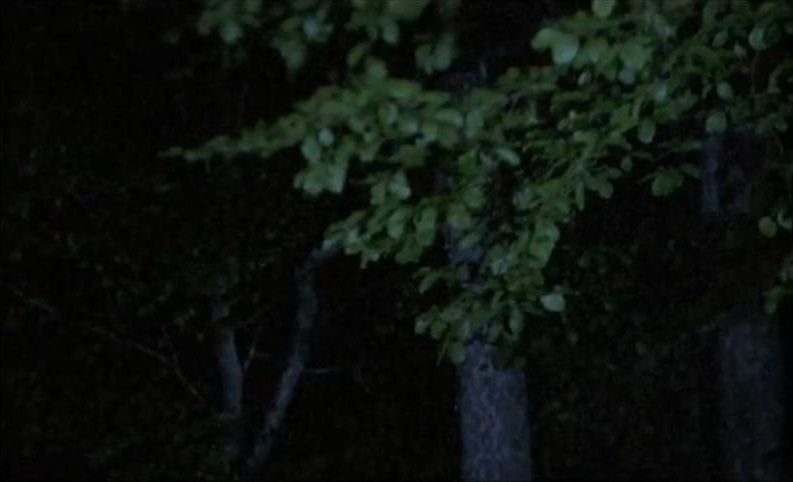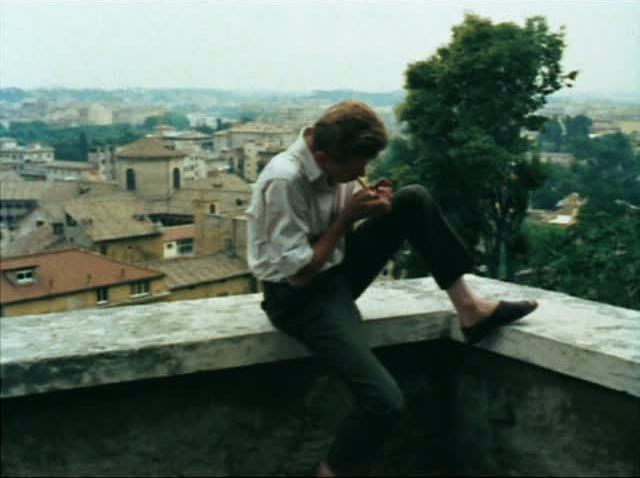Direct Sound: An Interview with Jean-Marie Straub and Danièle Huillet
Q: Italy has, to the rest of the world, the reputation of being the country that dubs ‘the best.’ The Italians don’t just dub the foreign films, but Italian ones as well: they are shot without sound, or with an international sound track, then they are dubbed. You are members of that group – and they are few enough – who film directly with sound; that is, who film the images and record at the same time the sounds of those images.
Straub: Dubbing is not only a technique, it’s also an ideology. In a dubbed film, there is not the least rapport between what you see and what you hear. The dubbed cinema is the cinema of lies, mental laziness, and violence, because it gives no space to the viewer and makes him still more deaf and insensitive. In Italy, every day the people are becoming more deaf at a terrifying rate.
Huillet: The thing is still sadder when you think that it’s in Italy that, in a certain sense, Western music, polyphony, was born.
Straub: The world of sound is much more vast than the visual world. Dubbing, as it is practiced in Italy, does not work with the sound to enrich it, to give more to the viewer. The greatest part of the waves that a film contains come from the sound, and if in relation to the images the sound is lazy, greedy, and puritan, what sense does that make? But then, it takes courage to make silent films.
Huillet: The great silent films give the viewers the freedom to imagine the sound. A dubbed film doesn’t even do that.
Straub: The waves that a sound transmits are not just sound waves. The waves of ideas, movements, emotions, travel across the sound. The waves that we hear in a Pasolini film, for example, are restrictive. They do not enhance the image, they kill it.
Q: There are filmmakers like Robert Bresson or, better, Jacques Tati who use dubbing intelligently. Certain Tati films would be much less rich if they didn’t have artificial sound.
Straub: You can make a dubbed film, but it is necessary to use a hundred times more imagination and work to make a direct-sound film. In effect, the sonorous reality that you record is so rich that to erase it and replace it with another sonorous reality (to dub a film) would take three or four times the amount of time needed to shoot the film. On the contrary, the films are usually dubbed in three days, and sometimes in a day and a half, there is no work. It would make sense to shoot without sound and then make an effort with the sound, in counterpoint to the image. But filmmakers tend to paste the background noises to the silent images that give the impression of reality, the voices that don’t belong to the faces we see. It’s boring, vain, and a terrible parasitism.
Q: Filming with sound costs less than dubbing.
Straub: Yes, but that would kill the dubbing industry and it violates the local customs.
Huillet: Directors prefer to dub out of laziness: if you have decided to make a film with direct sound, the locations that you choose have to be right not only in terms of the images but also in terms of the sound.
Straub: And that is translated into a thorough analysis of the whole film. For example, our last film, Moses und Aron, the Schoenberg opera, we shot in the Roman amphitheatre of Alba Fucense, near Avezzano, in Abruzzi. But we weren’t looking for an ancient theatre. What we wanted was simply a high plateau, dominated, if possible, by a mountain. We started to look for this plateau four years ago, in a borrowed car, and we put 11,000 kilometres on it, driving more on back roads and country lanes than on paved roads, through all of Southern Italy, down to the middle of Sicily. In the course of this research, we didn’t see one plateau, no matter how beautiful, that was good for the sound, because when we found ourselves on a plateau, everything was lost in the air and the wind. And, if there was a valley, we were assaulted by the noises from below. We were therefore obliged to reconsider our intentions and we discovered what we wanted, which was a basin or crater. And in the end, we saw that to film in a basin, in our case the amphitheatre, was better for the images also, because we had a natural theatrical space in which the subject, instead of being dissolved, was concentrated. We followed the opposite course of the Taviani brothers or Pasolini, who look for pretty spots, postcards such as you see in magazines, in which the subject of the film is dissipated instead of being localised. For us, the necessity of filming with direct sound, of recording all the singers you see in the frame, of getting at the same time their songs and their bodies that sing, led us to discoveries that meant we arrived at an idea that we would never have had otherwise.
Q: Filming in direct sound means also editing in a certain way, rather than in another.
Straub: That’s obvious. When you film in direct sound, you can’t allow yourself to play with the images: you have blocks of a certain length and you can’t use the scissors any way you want, for pleasure, for effect.
Huillet: It’s exactly the impossibility of playing with the editing that is discouraging. You can’t edit direct sound as you edit the films you are going to dub: each image has a sound and you’re forced to respect it. Even when the frame is empty, when the character leaves the shot, you can’t cut, because you continue to hear off-camera the sound of receding footsteps. In a dubbed film, you wait only for the last piece of the foot to leave the range of the camera to cut.
Q: Many filmmakers don’t believe in an empty frame with sound that continues off-camera, because they want cinema to be a frame: it should have nothing outside. They deny the existence of a world outside the frame. In your films, the off-screen space is something that exists and is materially felt.
Straub: That’s another illusion of the dubbed film. Not only are the lips that move on the screen not the ones that say the words you hear, but the space itself becomes illusionary. Filming in direct sound you can’t fool with the space, you have to respect it, and in doing so offer the viewer the chance to reconstruct it, because film is made up of ‘extracts’ of time and space. It’s possible to not respect the space you are filming, but then you have to give the viewer the possibility of understanding why it has not been respected and not, as in dubbed films, transform a real space into a constructed labyrinth which puts the viewer into a confusion from which he can no longer escape. The viewer becomes a dog who can’t find its young.
Q: In sum, direct sound is not merely a technical decision but a moral and ideological one: it changes the whole film and especially the rapport that is established between the film and the viewer.
Huillet: I must say this: when you arrive at the conclusion that you must do a film like that, you cut yourself off from the industry, more or less completely. If you refuse to film with just a general sound track, if you refuse to dub your film, if you refuse to use such and such an actor because he’s been seen too much and it’s absurd to always use the same faces, it’s over. You cut yourself off completely. In fact, the main reason for dubbing is industrial: only by accepting the dictatorship of dubbing can you use two or three stars from different countries in the same film.
Straub: And the result is an international product, something stripped of words, onto which each country grafts its respective language. Languages that don’t belong to the lips, words that don’t belong to the faces. But it’s a product that sells well. Everything becomes illusion. There is no longer any truth. In the end, even the ideas and emotions become false. For example, in Allonsanfan, and I mention this film because it’s not worth talking about Petri’s or Lizzani’s, there is not a single moment, not one instant where there is a true, human emotion. Not even by accident, by chance. It’s trash. It has only the illusion of a comic book.
Q: Many filmmakers identify the international aesthetic with the popular aesthetic, and accept dubbing, stars from different countries, and the rest, because they think it’s the only way to make successful films.
Straub: The international aesthetic is an invention and weapon of the bourgeoisie. The popular aesthetic is always a personal aesthetic.
Q: For the bourgeoisie, there is no art that is not universal. The international aesthetic is like Esperanto.
Straub: Exactly. Esperanto has always been the dream of the bourgeoisie.
--trans. Bill Kavaler, Film Sound: Theory and Practice, eds. Elisabeth Weis and John Belton (Columbia UP, 1985), p.150-153. This seems to be, until the conversation with François Albera titled Sickle and Hammer, Cannons, Cannons, Dynamite! included in the 2004 Viennale Straub-Huillet retrospective catalogue (original French version here), the last interview with Jean-Marie Straub and Danièle Huillet to be published in the English language. It is itself an abridged translation of a Cahiers du cinéma interview published in the 1970s. As far as I'm aware, nothing has emerged since. Information on any others is welcome.
























































